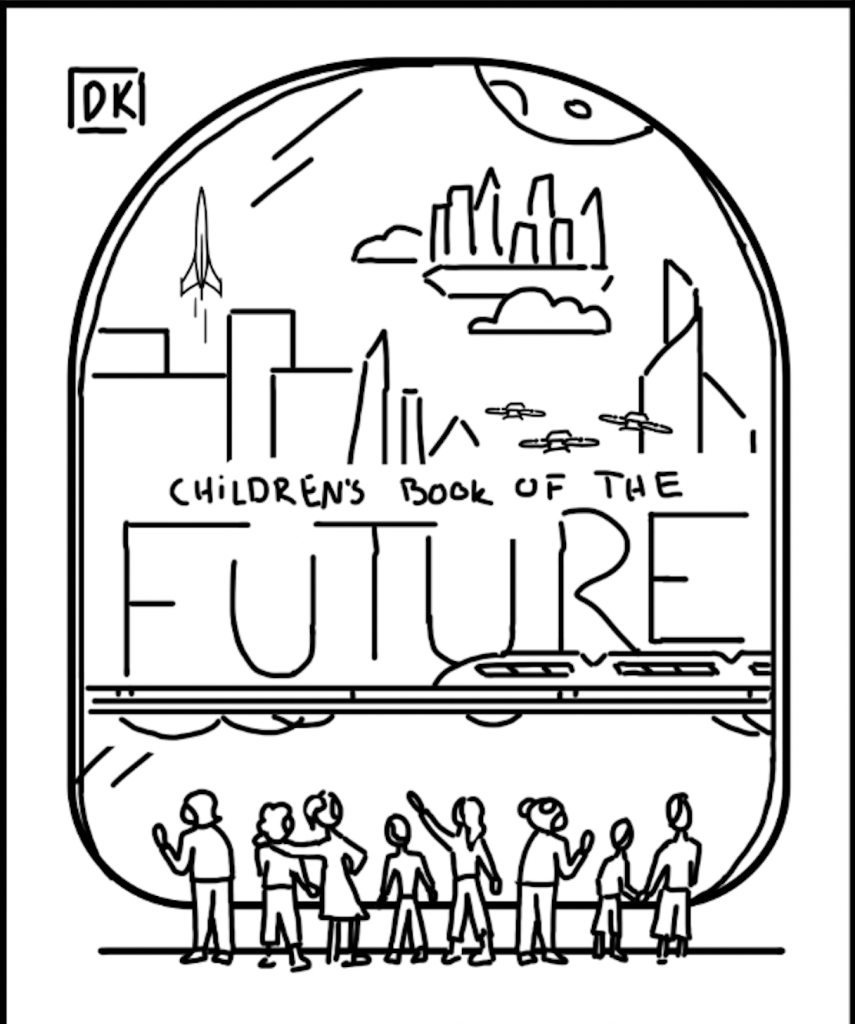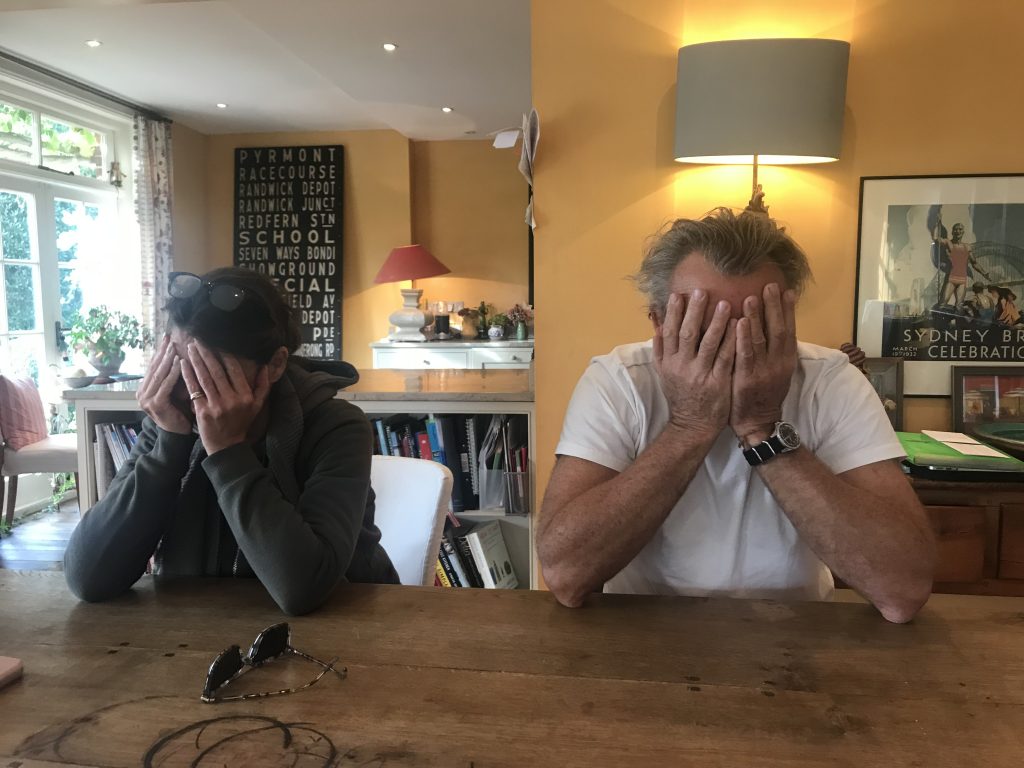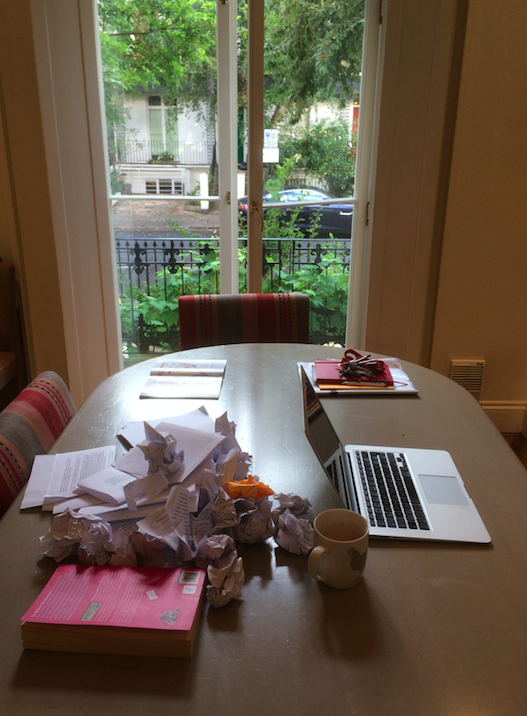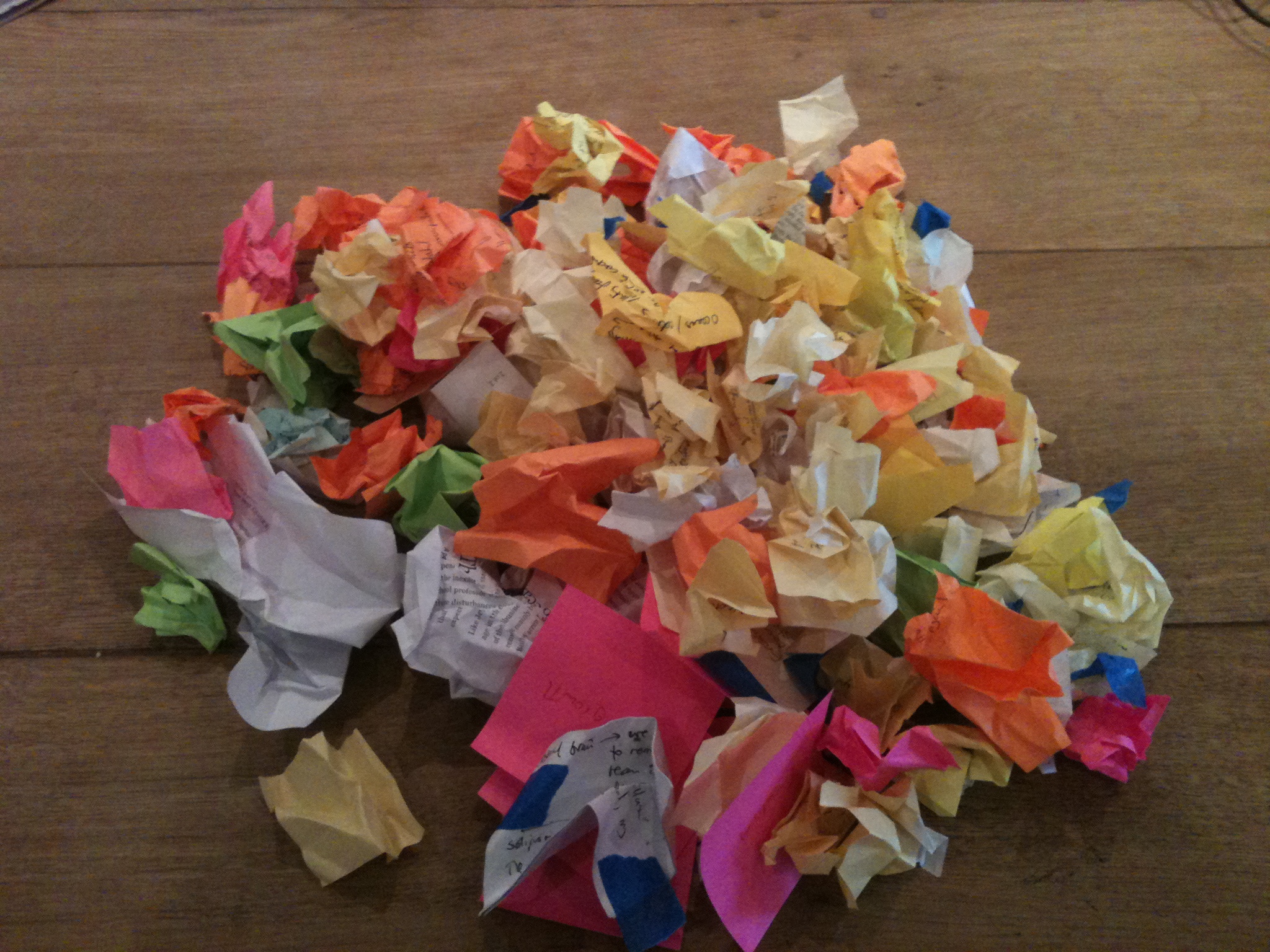
Category Archives: My Next Book
Having a bad day

Just got the feedback from the publisher on my new book. Great feedback. But essentially it’s a f%$£@!g re-write. That’s my friend on my right. She’s having a bad day too.
OMG, I just finished a book

Not 100% true. It’s finished in the sense that I hit the required word count, very mechanical, but it still needs a very big polish. The image above is London, which I’m finding far more condusive to writing. Weirdly, less distractions. Or maybe it’s the right kind of distractions. I can go into the fray or withdraw from it. In the country it’s almost too quiet and the famous flying dog* can drive me nuts. I’m seriously thinking of taking a week off and going to Greece on my own to do the final edit.
* Maybe I didn’t mention this? He jumped out of an upstairs window a few weeks back. Maybe that’s another book? The Day the Dog Jumped Out of the Window.
Sometimes you have to kill your babies
It breaks my heart, but sometimes you just have to kill an idea you’ve been working on for ages. Seems this book idea is dead. But there’ll be another one along shortly….
This book is a gentle plea for a different kind of thinking. Specifically, it’s an appeal for a calmer, slower, deeper and far more reflective mind-set, which I firmly believe is necessary if one wishes to escape from the humdrum and enter the extraordinary.
Calling this essay How to Think could be problematic. Do people really want to be told how to think? Surely thinking is an intuitive skill that doesn’t need thinking about? This is partly true, but on another level thinking requires conscious and deliberate effort.
Have you ever really thought about this?
We aren’t generally taught how to think at school and we don’t think about our thinking much thereafter. This is a great shame, because our thinking, especially our imagination, is perhaps the most precious natural resource we’ve got on earth. But it’s one that’s being polluted by endless streams of digital interruption and chocked by the narrow nature of education and the short-termism of politics and business. Our liberty to think openly and freely is also being eroded by universities supporting ‘no platform’ policies and by the visceral hatred endemic in so much contemporary debate.
This hasn’t always been the case, and it’s not true everywhere either. But our fixation with doing many things as quickly as possible at the lowest possible cost is making us, our institutions and society infirm. Even weekends and holidays, which were once times for relaxation and reflection, have been invaded by devices that demand our constant attention and disconnect us from our true selves. I might be wrong, but the collateral damage of our hyper-connected world might be that we are becoming less connected, both to ourselves, others, and the wider world. Our mental focus, like our education system, is shrinking when it should be expanding. We need to bring back breadth, depth, reflection and, above all, relentless curiosity.
Numerous people have written about the neuroscience of thinking, especially how our sly subconscious gets us into so much trouble.
We are surrounded by the debris of this on a daily basis.
We rush into roles, responsibilities and relationships without properly thinking, or we think about such things in a singular, linear and unconnected manner. We ignore the layered lessons of history, the cyclical nature of so much change and the counter-forces that often emerge in response to significant innovations or events.
Essays about the creative process abound too, but these tend to exist within a sterile vacuum divorced from real world pressures, organisational psychologies and institutional pathologies. Have you ever tried really thinking at work? Without permission? For a whole day? Without getting reprimanded? Or what of the impact of mood on thinking? Why don’t we think about this more often? Why are we so careless with the physical environments in which we expect our co-workers to think and our children to learn? On all counts, the result is thinking that’s becoming increasingly timid, lazy, shallow, sterile and one-dimensional, which is making us open to unmanageable surprises.
I would like to address all these issues and more, but from a positive perspective. I am less concerned about why things go wrong and more interested in how to put them right. How can we manipulate our meddlesome minds to make them more attuned to new risks? How can we become more sensitive to the faint murmurs that are so often the forerunners of opportunity? How should we embolden individuals and organisations alike to filter out utter nonsense, spot valuable anomalies or simply stop for a moment and take stock of where they are and what they are doing?
Most importantly, we are potentially on the cusp of a radical revolution in artificial intelligence. How might we educate our minds – and those of our children and our children’s children – to be open, adaptive and resilient in such a potentially disruptive environment? How should we think when machines can do this for us? How can we ensure that one of the major consequences of machines that can think isn’t people that don’t or needn’t? How do we guard against a situation where complacency or disenfranchisement means we no longer ask important questions like these?
I think the answer to all this is to become very good at the things these machines are very bad at. In short, we must work tirelessly to unleash our unique ability to think conceptually, counter-factually, originally and empathetically and inspire others to do the same.
And to do this I believe we need a moderate level of disconnection and a significant amount of time. Hence, we need to reclaim solitude, silence and patience. Without this no stable sense of self can emerge. Only when we are firmly anchored in ourselves can we hold useful conversations with others from which new ideas and insights will emerge. Only when we achieve a graceful lightness of being can we float above our everyday existence and jump joyfully from the world of sterile facts – the world as it is today – to the realm of imagination and ideas – the world as it might be tomorrow.
We cannot construct a long-term strategy for accomplishment, let alone one for the survival of our species, when we are smothered by busyness and distracted by ephemera. So, sit down, turn off your devices, un-divide your attention and come with me for a gentle stroll down some overgrown paths of possibility.
The book that never was
Not all of my books make it. This is the introduction from a book that’s been junked….
Introduction
“The other day I was thinking, “I just over think things.” And then I thought. “Do I though?” – Demetri Martin, Comedian.
This book is a gentle plea for more thinking. Specifically, it’s an appeal for a calmer, slower, deeper, more reflective, more deliberate and longer-term mind-set in everything from business and politics to holidays and household chores.
I initially thought of calling this book How to Think, but then I instinctively thought that perhaps people don’t want to be told how to think. Surely thinking is an instinctive skill that doesn’t need thinking about. But is this true? Have you ever thought about this?
We aren’t generally taught how to think at school and we don’t think deeply about our thinking very much thereafter. This is a great shame, because our thinking, and especially our imagination, is perhaps the most precious natural resource we’ve got on earth. But it’s being polluted by everything from endless streams of interruption to the unsustainable demands of narrow and numerically-based financial markets. Our liberty to think openly and freely is also being eroded, both by universities supporting ‘no platform’ policies and by the visceral hatred endemic in much of our polarising political culture.
This hasn’t always been the case, and it’s not true everywhere either. But our fixation with doing everything as quickly as possible is making us, our institutions and society infirm. Even weekends and holidays, which were once times for relaxation and reflection, have been invaded by digital devices that demand our constant attention and disconnect us from our true selves. I might be wrong, but the collateral damage of our hyper-connected world might be people that are less connected, both to themselves, and the wider world around them. Our mental focus, like our education systems, is shrinking when it should be expanding. We need to bring back breadth, depth, lifelong wonder and curiosity.
There have been a number of books about the neuroscience of thinking, especially how our sly subconscious gets us into so much trouble. We are surrounded by the debris of this on a daily basis. We rush into roles, responsibilities and relationships without properly thinking, or we think about things in a singular, linear and unconnected manner. We ignore the layered lessons of history, the cyclical nature fashion and the counter-forces that often emerge in response to any significant innovation or event.
Books about creativity and innovation abound too, but these tend to exist within a sterile vacuum divorced from real world pressures, organisational psychologies and institutional pathologies. Have you tried really thinking at work? Without permission? For a whole day? Without getting reprimanded? Or what of the impact of mood on thinking? Why don’t we think about this more often? Why are we so careless with the physical environments in which we expect our co-workers to think and our children to learn? Why is our obsession with external architecture so often to the exclusion of the other sensory elements, for example the architecture of touch, sound and smell?
On all counts, the result is thinking that’s becoming increasingly timid, lazy, sterile and one-dimensional, which is making us open to unmanageable surprises.
I would like to address all these issues and more, but from a positive perspective. I am less concerned about why things go wrong and more interested in how to put them right. How can we manipulate our meddlesome minds to make them more attuned to emerging opportunities and risks? How can we become more sensitive to the faint murmurs that are so often the forerunners of change? How should we embolden individuals and organisations alike to filter out utter nonsense, spot valuable anomalies or realise the significance of an overheard anecdote? How, for instance, might an organisation use smell to increase productivity?
Most importantly, we are possibly on the cusp of a radical revolution in artificial intelligence and advanced machine learning. How might we educate our minds – and those of our children and our children’s children – to be open, adaptive and resilient in disruptive environments? How should we think when machines can do this for us? How can we ensure that one of the major consequences of machines that can think isn’t people that don’t or needn’t? How do we guard against a situation where human complacency or disenfranchisement means we no longer ask questions like these?
I think the answer to this is to become very good at the things these machines are very bad at. In short, we must work tirelessly to unleash our unique ability to think imaginatively, ethically and empathetically and inspire others to do the same. And to do all this, and much more besides, I believe we need a moderate level of disconnection and a significant amount of time. Without this no stable sense of self can emerge. Only when we are firmly anchored in ourselves can we hold conversations from which new ideas and insights will emerge. Only when we achieve a graceful, joyous, lightness of being can we float above our everyday existence and correctly perceive, and solve, the global challenges that lie ahead.
We cannot construct a long-term strategy for human accomplishment, let alone one for the survival of our species, when we are smothered by busyness, distracted by ephemera or constantly running to keep up with the accelerated present.
Sit down, turn off your phone, switch on your attention and come with me for a gentle stroll down some hidden paths of perception and possibility.
The Nature of Now
Having had a few ‘off’ days, yesterday proved fruitful writing-wise. I’m starting chapter three, which is essentially about science, and had rather too much fun pondering the nature of existence. Here’s an early snippet… please shout if I’ve got anything wrong.
The Sci-fi writer Philip K Dick has suggested that reality is something that if you stop believing in it doesn’t disappear. Mountains exist whether we want them to or not. In contrasti If enough people stop believing in a company, a government or the myth that a $50 bill is worth something then all would indeed disappear.
Better still imagine a planet with no people. We think of language, ideas or history as real, but without humans they all vanish. As Max Planck, the founder of quantum theory, observed: “I regard consciousness as fundamental. I regard matter as derivative from consciousness.”
Such solipsism is already getting a little The Matrix-like, but it gets better. Think again of Yoo-Chul and Choi Mi-sun, the couple that allowed their daughter to starve to death. We regard their daughter as real and their avatar love child as not, which is a binary distinction. Putting to one side the problem of human versus animal rights (scientists have shown that some apes and birds can be more intelligent than three-year-old children, but it’s the children that have the legal rights) there’s the issue of future avatar and robot rights.
For example, the EU parliament is considering giving robotic companions legal ‘person hood’ in a move that could allow them to carry out financial transactions or collect prescriptions of behalf of humans, although one of the implications of this is that robots could be made liable for damage to real property or people with the consequence that the ‘owners’ of the robots – individuals, corporations or governments – might be shielded from any responsibility. That’s a real get-out-of-jail card.
And as the binary distinction between humans and machines blurs or dissolves, especially as we integrate our machines into our bodies or alter ourselves genetically, so might any meaningful distinction between real land virtual vanish.
Imagine, for instance, a future in which you put on a VR headset and instead of RL vanishing it’s still there. Flick a switch (or more likely vocalise a command) and suddenly ‘things’ start to appear in front of our eyes. This is a foretaste of what some people call ‘mixed reality.’ And what if we push things even further. How about a world where gaming in virtual or mixed reality worlds has RL implications?
Some games already include elements of culpability and it’s not too much of a stretch to foresee a situation where harm done to virtual companions – or virtual strangers – has real life legal implications. At the moment, it seems crazy to suggest that we might one day confuse the real with the imagined, but what if we create robots that so successfully mimic human interactions that we start treating them like humans? If a robot were to glance into the distance when you asked it a question or displayed random head movements or twitches we might feel comfortable with them to the point of confiding in them or even falling in love with them. At this point what exists and what doesn’t?
Some experts believe that we will never be able to create conscious machines because to be conscious requires the total integration of memory or experience. For example, there’s a huge difference between a computer containing digital photographs of everything that’s ever happened to us and one that can make connections between each photograph to create memory or identity or edit the images to tell stories.
On the other hand, how do we know that what we experience is real whereas that which a machine experiences is merely a simulation? Surely both could be simulations? How do we know, for instance, that you are not dreaming about reading this? What if VR became so compelling that RL has no appeal? Maybe that’s what we’re seeing already and maybe that’s where we are all eventually heading, although if that’s true how do we know that we haven’t simulated reality already?
This mend-bending idea belongs to, among others, Nick Bostrom, a philosophy professor at Oxford University, and tips us not only into The Matrix, but juicy questions about the nature of reality, religion and the universe itself. What if, for example, ‘life’ along with heaven and hell existed as simulations or game plays and we progressed between the levels over time?
There are many objectors to this idea of reality, as there are to the nature of time and space, which obviously intersect with any discussion of past, present and future. For most physicists, time is not real. Past, present and future are all real and all indistinguishable and any sense of ‘now’ is nonsensical. ‘Now’, in galactic terms, is as silly as ‘here’ or ‘me’ on a map of the universe from inception to end.
‘Now’ happens at different times and depends upon what speed anything or anyone is travelling, whereas ‘here’ depends upon your vantage point. Time does not flow anymore than ‘here’ or ‘me’ does. That’s the theory. But surely the flow of time is essential to how we on earth perceive ourselves. Time flowing is one of the primary human experiences, in contrast to our machines who no nothing of ‘me’, ‘here’ or ‘now’.
If you throw out relativity theory and look at quantum theory instead the picture is rather different. In quantum physics future events are determined by present possibilities, much as our reality exists in more than one state depending on who is experiencing or viewing it. The practical and rather energising outcome of this thought is clearly that the future does not exist until we create it and shimmers into existence one decision at a time. Or perhaps multiple futures and realities co-exist, but only one ever comes alive when we decide to pursue one path or option versus another.
…continues
The new book
Bloody hell. Trying to write chapter three of a new book. Going nowhere, so I’m going to dig a ditch and plant a hedge.
BTW, found this on how the use of CGI in movies “has become wearingly dull and cliched” yesterday. Worth a read (3,000 words).
Future Now
I’ve got the go-ahead for a new book, which is a good thing, but every time I write something it happens. This is not supposed to happen.
The latest example is a story today in the newspaper about Personalised Health and Care 2020, which suggests that family doctors should prescribe apps to patients in the future. My chapter on health was entitled “Your doctor is an app.”
This situation slightly reminds me of William Gibson, the science fiction writer, who several years ago allegedly announced that he was no longer writing about the future because the present was becoming quite weird enough.
“Without a sense of how weird the present is — how potentially weird the present is — it became impossible for me to judge how much weirder I should try to make an imagined future”
So what to do? One solution might be to pitch things much further into the future, but this runs the risk of sounding like a science fiction writer, which I am clearly not. When people ask me to talk about the future they usually mean a chewable, understandable future that is somewhat trend-based and logical. If you go too far out people complain that it’s either too speculative (that’s the whole point!) or not something that is practically applicable (why does it have to be?).
Perhaps the answer is to move backwards. To use a mirror rather than a crystal ball – the future an excuse to discuss what we are doing right now, which is possibly back to the central purpose of science-fiction.
BTW, exchange on the train yesterday: A somewhat grubby man with one arm got on-board and asked, nicely, for some money. Everyone on the train looked downwards to avoid eye contact. I gave him about five quid and the man thanked me and shuffled off. The man seated opposite to me then said: “He’ll probably just spend it on drugs” to which my response was: “Well that’s more or less what I spend it on.”
(Children, if you are reading this, this was a far too obscure reference to alcohol, coffee and perhaps legal painkillers. I am not, yet, a crack addict).
Language Inflation
This is going in the new book. I popped into a pet superstore today to buy copious amounts of dog food. Patiently waiting in line at the checkout, a customer rushed up to the desk and said, in an excited tone, that there was a “health and safety incident” in the store. I was expecting some trivial thing, such as a wet floor or broken glass (i.e. no big deal), but it was much better than that.
Being a curious sort, I momentarily stepped out of line and followed the excited customer and the bored sales assistant into the small animals aisle. “Look, there is a piece of paper on the floor.” (it was about 20cm square). “My wife knows someone that slipped on a bit of paper in Tesco and broke an arm.” (I’m not making this up).
I’m sorry? You think this is a health and safety “incident”? Have you thought of actually being alert and walking around it? Or perhaps you could be responsible and just pick the bit of paper up. (I didn’t actually say that. But I wish I had – but if I had there would have been an incident).
New book about the shape of things to come
If you are wondering how my new book is coming along, see the photograph above.
I’ve written the preface and started on chapter one, but I keep getting distracted (the latest distraction being the dog who went outside, found a rabbit and ate it, fur, feet and all).
Anyway, here’s my draft chapter list. Any thoughts out there? What have I missed?
Part One: Right here, right now
1. Society & Culture: Digital vs. human
2. Economy & Money: Only a bubble when it bursts
3. Science & Technology: Too fast, too future
4. Media & Entertainment: Afraid of being invisible
5. Transport: Self-driving planes, trains & automobiles
6. Food & Water: Obese, undernourished & thirsty
7. Retail & Leisure: We can print that in your size
8. Healthcare & Medicine: The computer will see you now
9. Travel & Tourism: Re-connecting with reality
10. Environment & Resources: A scramble for security
11. Home & Family: The real robot revolution
12. Education & Learning: Your teacher is an app
13. Work & Business: The end of globalisation
14. War, Peace & Politics: The weak grow strong
15. Religion & immortality: Is death the new sex?


